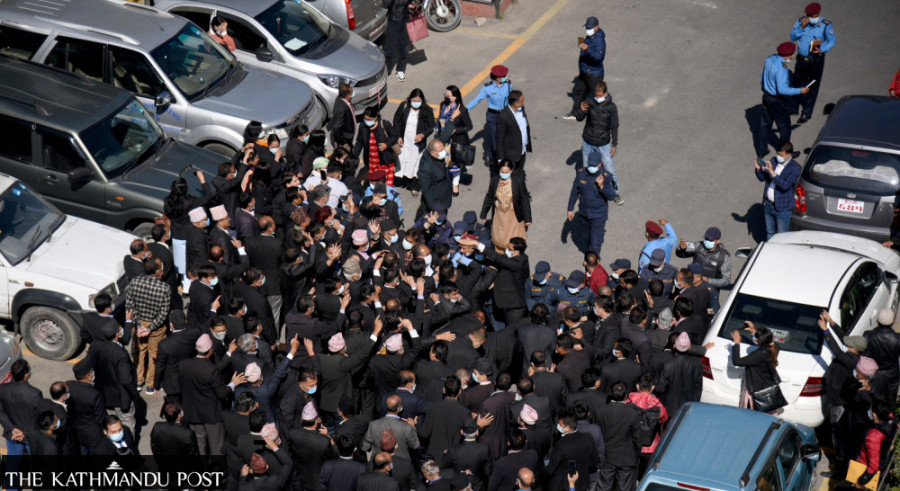National
Should the court be left alone to clear the air over judiciary?
Experts say government should summon Parliament to start impeachment process.
Anil Giri
Nepal’s temple of justice has been sullied like never before. The justices are up in arms against Chief Justice Cholendra Shumsher Rana. Lawyers are breathing fire demanding Rana’s resignation. The man under scrutiny, the head of the country’s judiciary, however appears to be unperturbed, largely because political parties that can constitutionally remove him from office have maintained silence.
Amid this, there are calls that the executive must speak up. Many say a key branch of the state cannot be a mute spectator when another is facing a serious crisis. Others say it is better for the executive to stay away from the crisis in the judiciary.
Amid this, Prime Minister Sher Bahadur Deuba has ruled out any intervention in the judiciary. And prima facie, his position appears to be correct, given the separation of powers, an essential element of the rule of law, which is enshrined in the constitution.
The separation of powers ensures checks and balances, with rights of mutual control and influence, to make sure that the three powers interact in an equitable and balanced way.
Subas Nembang, who chaired the Constituent Assembly that wrote the constitution, said that the crisis in the judiciary is of grave nature but there’s nothing the government can do.
“Why and how can the executive make a position on something going on in another constitutional organ whose independence has been guaranteed by the constitution?” Nembang, a lawmaker from the main opposition CPN-UML who is also an advocate, told the Post. “Yes, political parties and their leaders can speak. They can even file an impeachment motion if they so wish. Once such a motion is filed, the onus lies on Parliament.”
But since parties have been dragging their feet for reasons known and unknown, the judiciary crisis is protracting and confrontation is escalating.
For the last three weeks, justice delivery has been affected, as not even one case, except for some habeas corpus petitions, has been heard by justices.
On Thursday, the Supreme Court where disputes are supposed to be settled in a peaceful way turned into a battleground as lawyers clashed with police. As many as six, including the general secretary of Nepal Bar Association, the umbrella organisation of lawyers across the country, were injured.
An enraged Nepal Bar then decided to up the ante. It announced that it would stop the chief justice from entering office on Friday.
In view of possible clashes, the government decided to send the Armed Police Force to reinforce the Nepal Police personnel deployed at the court. After criticism, the Armed Police Force was withdrawn on Friday, but by that time questions had arisen why the state acted swiftly to send additional police force.
After confrontation escalated in the judiciary, Prime Minister Deuba on Friday held consultations with Home Minister Bal Krishna Khand, Minister for Law, Justice and Parliamentary Affairs Dilendra Prasad Badu, Attorney General Khamba Bahadur Khati and some Nepali Congress leaders with legal backgrounds.
Besides Law Minister Badu, who advised the prime minister against interfering in judicial matters, the Congress leaders also suggested that the government should not take any formal position on matters related to the judiciary.
According to a ruling party leader, most of them were of the view that the executive making a position on something related to the court, especially regarding whether the chief justice should resign or not, could disturb the checks and balances.
Ramesh Lekhak, a senior Nepali Congress leader who is also an advocate, said there is nothing for the government to say about the Supreme Court crisis.
“After the then chief justice Khil Raj Regmi was made the head of executive, ambitions grew among the leaders of judiciary,” said Lekhak, hinting that the incumbent chief justice too may be harbouring similar ambitions. “As far as the current crisis in the judiciary is concerned, the government is not taking any position.”
Experts on constitutional matters say the political parties should take up the case and should move an impeachment motion against the chief justice if they think allegations against him are well-founded.
“It’s the state’s duty to ensure independence of the judiciary and it should create an environment for everyone to access justice,” Chandra Kant Gyawali, an advocate who specialises on constitutional law, told the Post. “Since the chief justice has caused obstruction in justice delivery, the state must tell him to create an environment so that everyone has easy access to justice.”
Krishna Belbase, a professor of law, said the government must summon Parliament so that an impeachment process can be started.
“It’s Parliament that can try the chief justice; the executive has no control over the judiciary,” he said.
Bipin Adhikari, a constitutional expert, said that the government should immediately summon Parliament and initiate the process to impeach Rana.
“Since the government itself has been dragged in the chief justice case, instead of intervening in the matter, it should facilitate parliamentary process to resolve the crisis,” said Adhakari.
“The prime minister should consult with stakeholders and summon the House. As questions are being raised about Supreme Court judges, Parliament is the right place to discuss such issues.”
On Saturday, a meeting of sitting and former office bearers of Nepali Congress also discussed the ongoing dispute in the judiciary where opinions were divided, said Congress leaders.
“Justices are boycotting hearings, the judiciary is in crisis, so the Nepali Congress should speak up,” senior Congress leader Ram Chandra Poudel told the meeting. But Prime Minister Deuba is learnt to have opposed the view saying political parties should not interfere in judicial matters and the judiciary itself should find a solution.




 13.12°C Kathmandu
13.12°C Kathmandu














